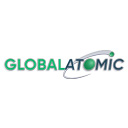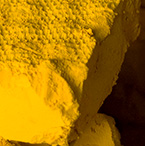Global Atomic (GLO) - Breaking Ground & Funded to Production
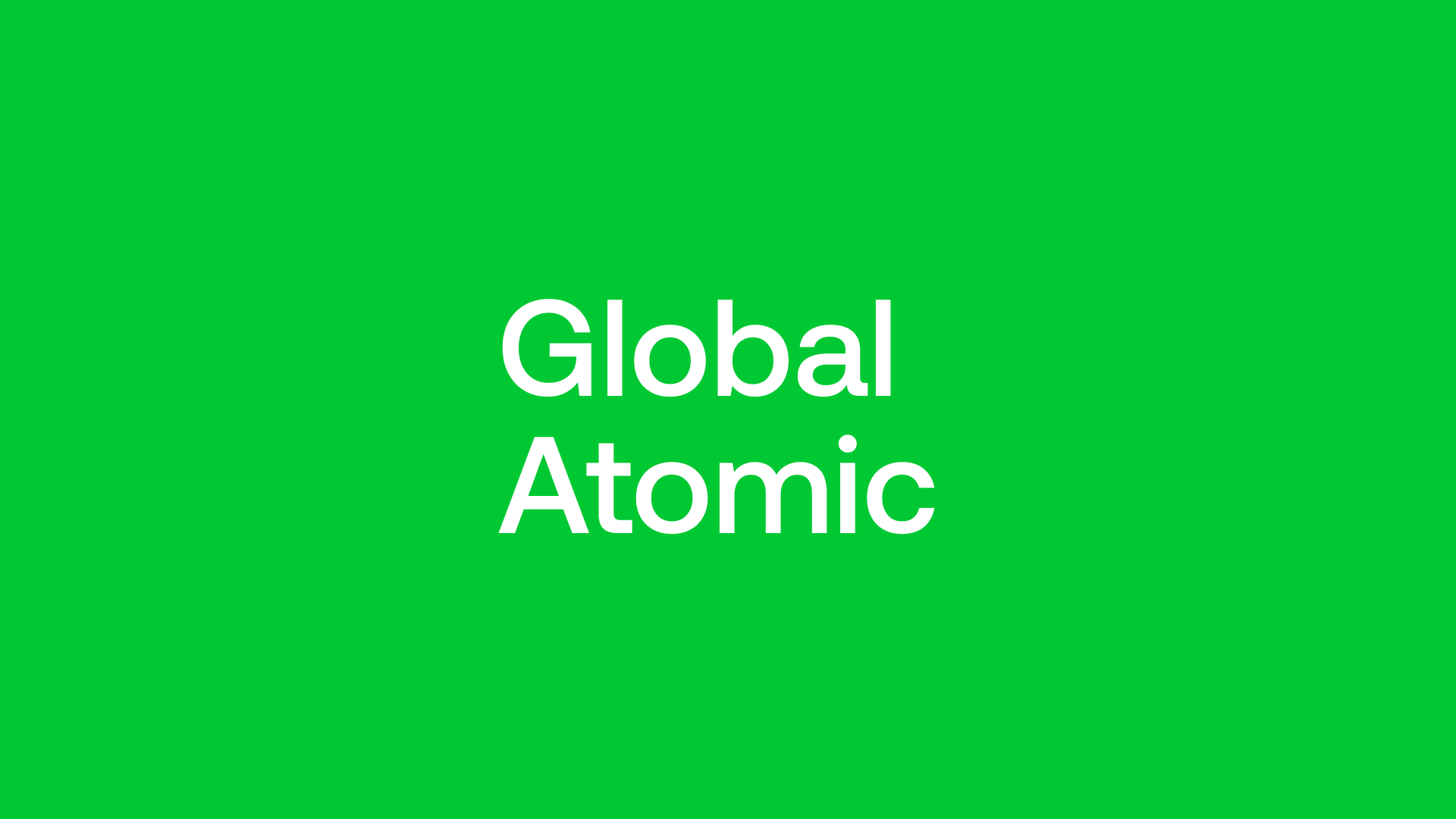
Interview with Stephen Roman, Chairman, President & CEO of Global Atomic Corp.
Global Atomic is a Canadian resource company advancing the large, high-grade Dasa uranium deposit in the Republic of Niger. The company benefits from the dividend stream generated by its share in the Befesa Silvermet zinc concentrate production facility in Turkey.
Matt Gordon caught up with Stephen Roman, CEO, Chairman, and President, Global Atomic. Stephen has over 4 decades of experience in successfully identifying, financing, developing, and commencing production at multiple mining and gas projects.
Roman previously served as the Founder, Co-Chairman, and Director at Gold Eagle Mines Ltd. He has also worked as a Policy Advisor to the Canadian Minister of National Defense. In 2016, he received the Bill Dennis Award for Canadian Mineral Discovery from the prestigious Prospectors & Developers Association of Canada (PDAC).
Company Overview
Global Atomic is a mineral exploration company founded in 1994 and is headquartered in Toronto, Canada. The company's flagship asset is the Dasa project in the Republic of Niger, a high-grade, low-cost uranium project with a PEA (Pre-Economic Assessment). The company also produces zinc concentrate from recycled steel dust in Turkey. The company is listed on the Toronto Stock Exchange (TSX-V: GLO), and the OTC markets (OTCQX: GLATF). Global Atomic was among the top 25 companies in the OTC markets in 2020.
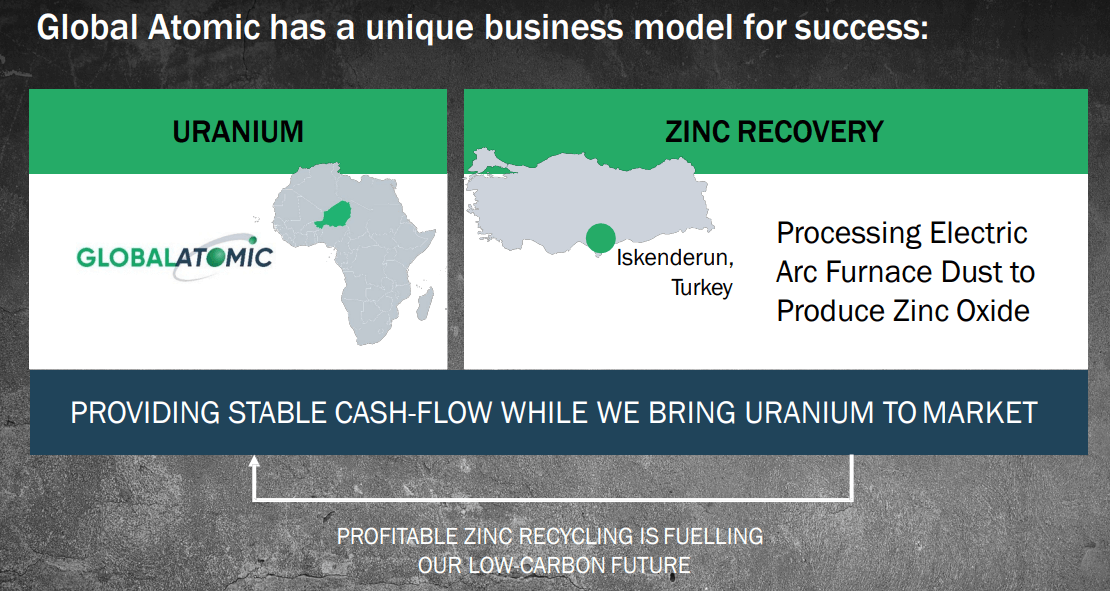
Cash Position
Global Atomic has a current market cap of $700M. The company recently raised $30M in capital through a private placement bought deal. Previously, the company had a mix of retail and institutional investors, with the latter accounting for up to 95%. The capital raise was accompanied by $6 in warrants, which upon exercising would generate an additional $20M for the company. Its previous warrants are still in the market and are due expiry in 2022. The capital raise paired with the warrants provides the company equity to continue operations in 2022.
The company chose to raise capital through private placement over a prospectus deal. This was necessary as the latter would lead to significant scrutiny from the Ontario Security Commission along with a 1-2 month delay. The private placement enabled the company to take advantage of the strong year-end market. The investors benefited from the half-warrant attached to the deal as the issue has a 4-month hold stock that is expected to close by 7th December.
The capital raise leads to minimal dilution for the company on a percentage basis. The half warrants were offered at a higher-than-normal price of $6. Global Atomic also saw an appreciation of its shares within the past few months, where the value jumped from $3.22 to $3.95 along with a $4 half warrant.
In addition to the capital raise, the company also has $30M in warrant exercise capital along with 2 cash-generating businesses. The company is looking to pay off the loan at Befesa Silvermet in Turkey before the end of this year. Once the loan is cleared, the company will start generating dividends. The company also generates monthly revenue through management fees and sales commissions. The company intends to pay out dividends in February or March on an annual basis.

The Befesa Silvermet Project
The Befesa Silvermet asset is a Joint Venture with Global Atomic holding a 49% stake in the project. Befesa S.A, a metallurgical company operating in the aluminum slag recycling and steel dust recycling space holds the remaining 51% stake. The project CapEx (Capital Expenditure) for the project is $200M including contingency.
Atomic Global anticipates that if its guidance continues at the current pace, the company will be at a 70% production capacity with potential for growth in 2022. The company is looking to ramp up steel production and reach 80% capacity. The company anticipates that the current zinc market pricing might place its project a year ahead of schedule. If the current zinc prices remain stable at $1.50/lb, the company will generate between $10M-$15M in annual profit. At full capacity, the company has an annual production capacity of 60Mlb zinc.
The capital raise enabled the company to maintain the ongoing momentum of its operations. The company had originally planned to initiate construction in January 2022, but it was able to commence the process in November, 2 months ahead of schedule.
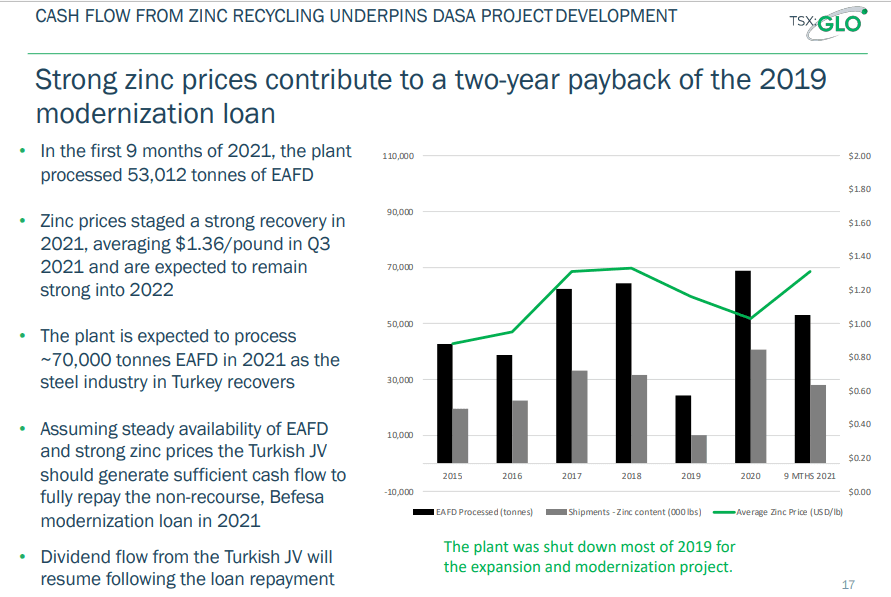
Feasibility Study Results
Global Atomic published its Feasibility Study in November. This included the optimization for the change in shipping prices, which have jumped up to 500% in recent months. However, there are indications that the pricing will come down.
The study also takes into consideration the price jump in sulphur which has gone from an $80t-$100t range to $200t. The company anticipates that by the time it enters production, the pricing of sulphur will stabilize.
The company had an increased drill intensity in certain areas of the deposit along strike length. These small pods were included in the phase 1 Feasibility Study, leading to a significant jump in the development cost.
The company has posted conservative numbers for its OpEx (Operational Expenditure) and CapEx. It actively seeks to further improve these metrics by focusing the development on Zone 1 and Zone 2 areas. The company is currently drilling on strike length at the Zone 2 area, which is a part of its 15,000m drill project. The initial drill indications have been positive, and the company is looking to publish the drill results by Q1, 2022.
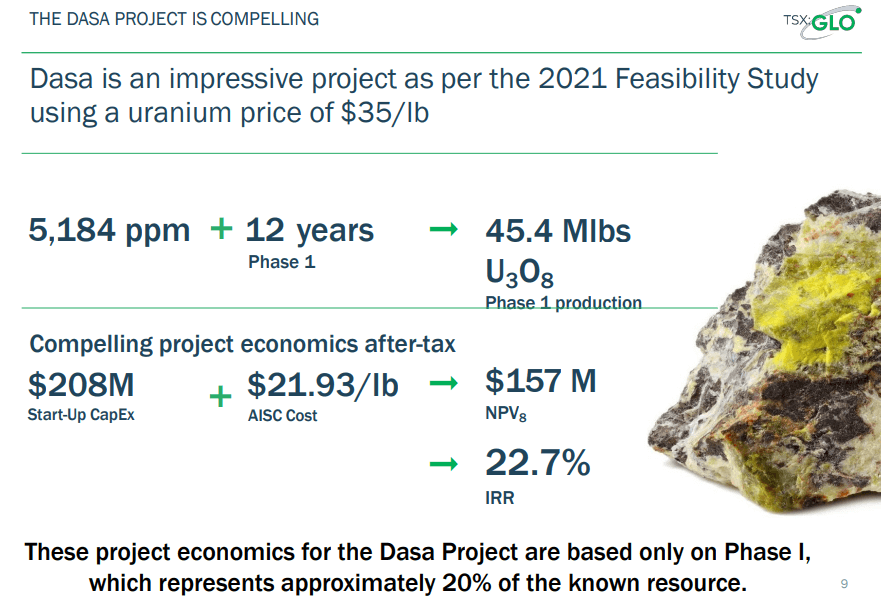
Ongoing Operations
The Dasa Uranium Project is the largest, highest-grade uranium deposit in Africa, located in the Republic of Niger. The company is focusing on near-term mining with limited underground development, which could result in a significant reduction in cost. Additionally, the company is working towards further refinement of the overall mine design and the mill process.
Furthermore, the company is looking for ways to cut down shipping costs to sidestep the price jump and shipping delays. The company is now looking to source a major portion of material locally in Niger along with surrounding countries. This has enabled the company to maintain the overall cost profile for the operation close to the PEA (Preliminary Economic Assessment) numbers.
The project's PEA is evaluated at $203M, while the Feasibility Study indicates a capital cost of $208M. Local sourcing and fabrication have enabled the company to maintain its production costs. The company has also hired local contractors and logistics experts that are assisting in determining the ideal shipping partners while keeping the costs down.
Global Atomic is currently in discussions with Orano for directly shipping ore from its development phase mine to Orano's Somaïr plant. This can potentially lead to revenue generation by early 2023. The newly-generated revenue stream would enable the company to support the financing for its own plant. The current debt-equity ratio for Global Atomic is indicated at 65-35, 70-30. However, the recent capital raise along with the upcoming warrants would effectively remove this component from the equation.
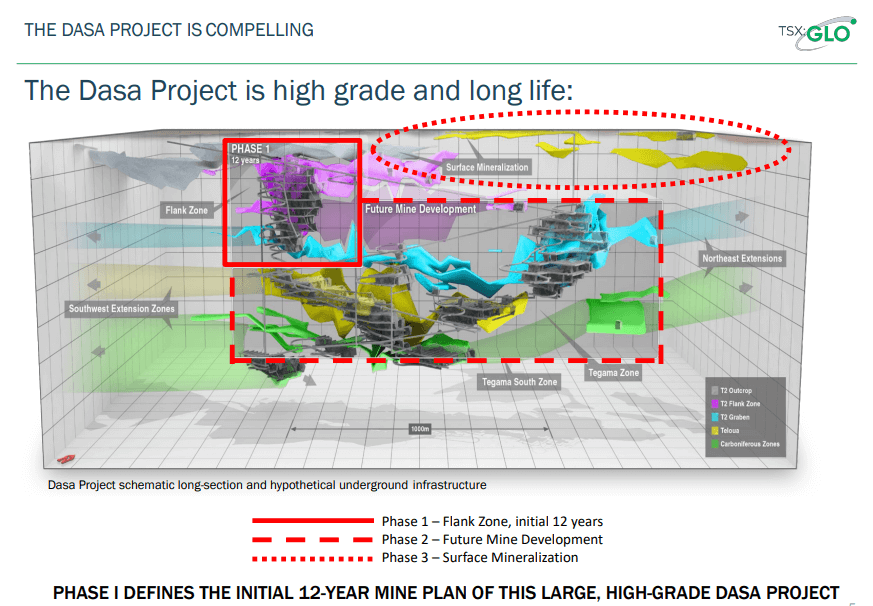
The Uranium Market
As per Global Atomic's Feasibility Study and PEA, the break-even number for uranium production is $35/lb. Uranium is currently trading at $47/lb in the market and a lot of companies within the industry are anticipating the uranium to reach $55/lb-$60/lb. The last high in uranium was in 2007 when the pricing reached $136/lb.
There have been several factors that have pushed the pricing and interest in uranium in 2021. The COP26 (Glasgow Climate Change Conference) support for nuclear power as a green and sustainable energy generator has generated a strong demand for uranium in the market.
The establishment of the SPUT (Sprott Physical Uranium Trust) also generated significant interest in the utility market. Bigger players such as Kazatomprom and Yellow Cake PLC have also made their presence known in the uranium market through major announcements.
China's announcement to build 150 nuclear reactors within the next 10-15 years has demonstrated the upcoming demand for uranium in the market. A major part of China's uranium supply is sourced from Africa. These developments collectively have led to a significant clean-up of physical uranium supply from the market.
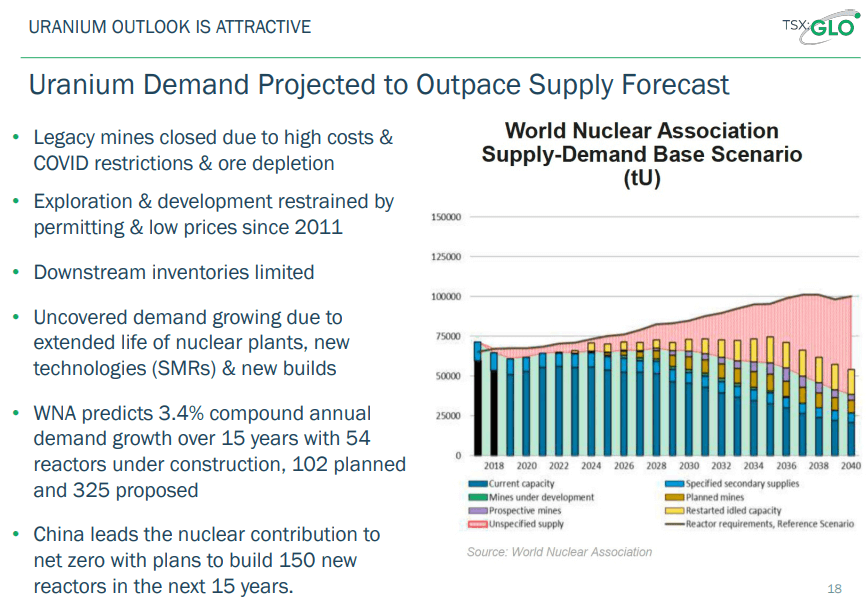
Plans 2021 and Beyond
Global Atomic is looking to enter production and start shipping at the Dasa Uranium Project by January 2025. Due to the supply shortage, the company has also discussed the possibility of pre-payments from utility buyers. In such a scenario, the company would no longer require additional funding.
The uranium project is a company-building asset. It is looking for a longer-term vision for this tier-1 project. The company aims to create a strong uranium market as a producer, eventually becoming one of the top 3 uranium producers in the market.
The company anticipates that its Dasa uranium asset would supply uranium to the market for the next 50 years. As per the company, the ongoing revenue generated from Turkey will enable it to develop a solid, dividend-producing company that would generate cash flow for years to come.
The company is open to the possibility of M&A (Mergers and Acquisitions) in the future at the right price. The company is currently conducting interviews and hiring new employees. It is building an on-site team and getting camps ready. The company has also received strong support from the Niger government to bring the asset into production at the earliest.

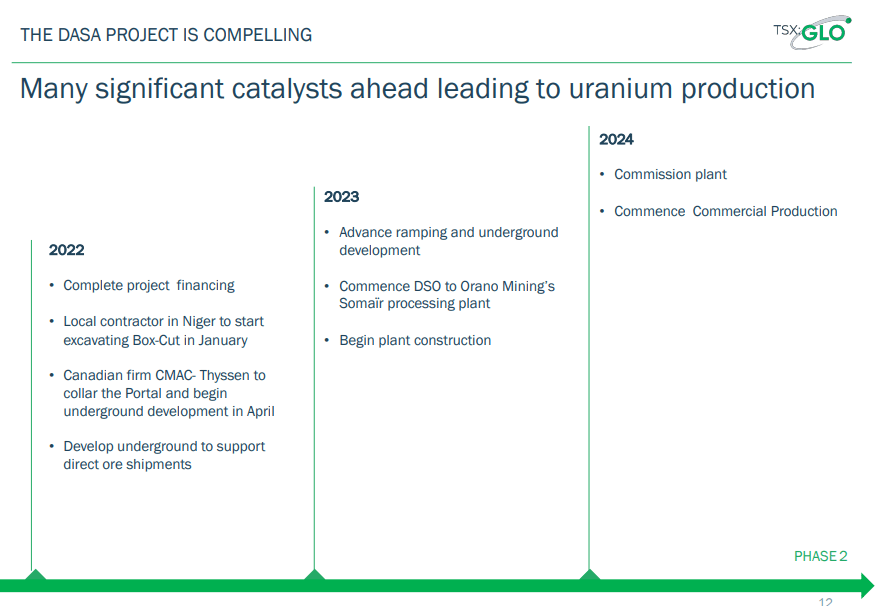
To find out more, go to the Global Atomic Website
Analyst's Notes




Subscribe to Our Channel
Stay Informed










